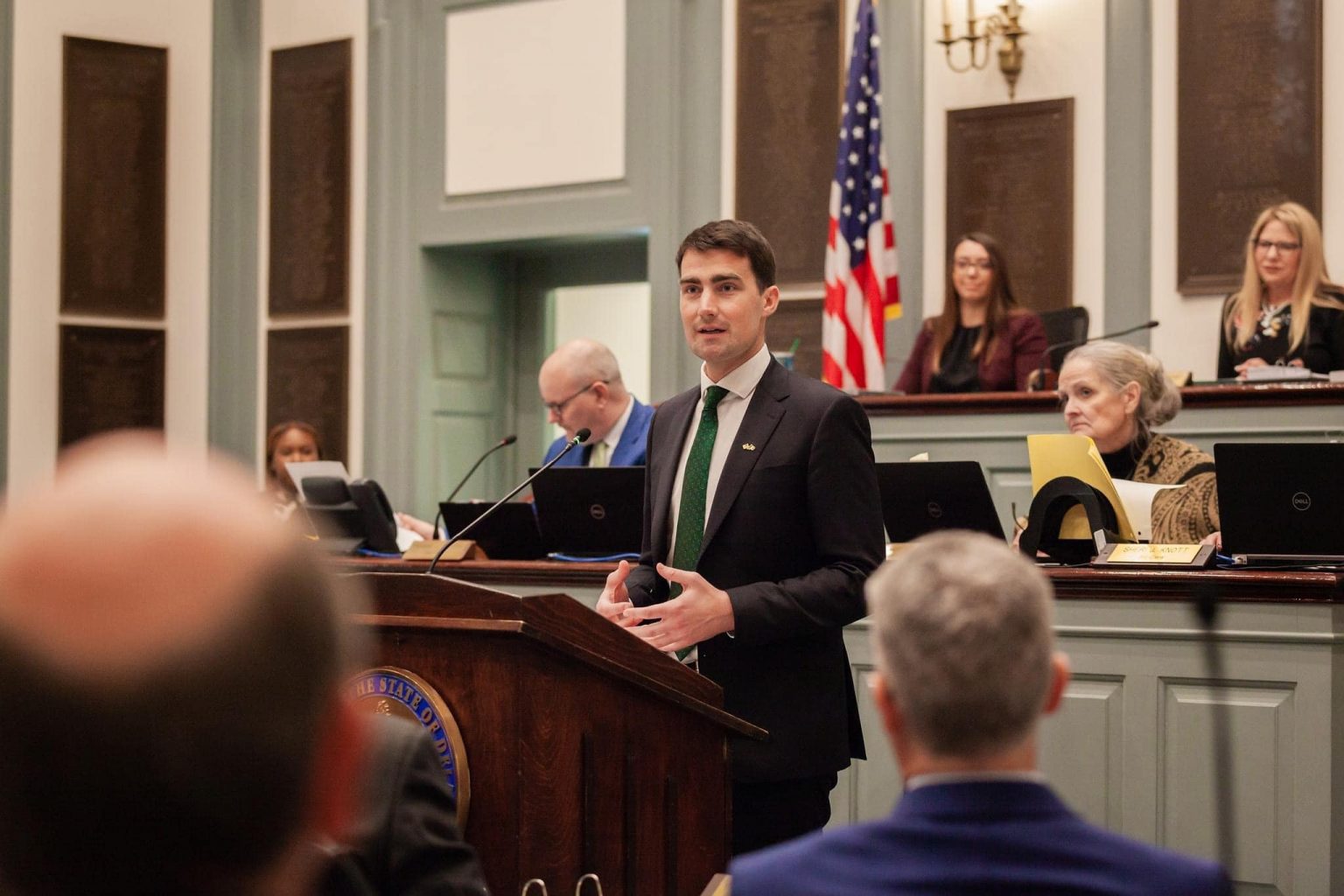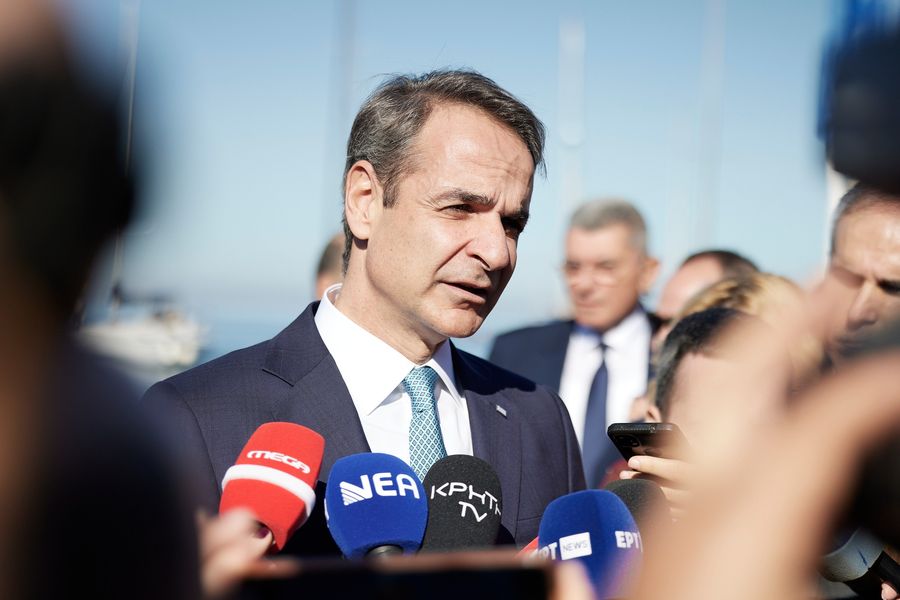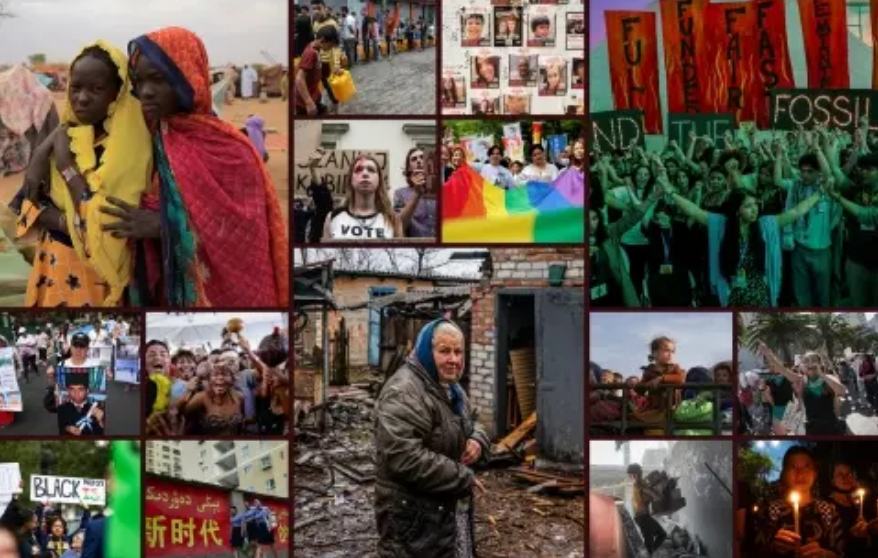World
Out in the World: LGBTQ news from Europe and Asia
Irish State Minister Jack Chambers has come out as gay

IRELAND

In an Instagram post on Sunday, Irish State Minister Jack Chambers, who is a member of the lower house of the Irish Parliament for Dublin West, the Teachta Dála, came out as gay.
Chambers wrote: “Here’s a look back at some of 2023. As I look forward to 2024 I am sharing with you something a little different but it’s something I wanted to do for a while.
As a politician it can sometimes be difficult to speak about my own personal life and that can lead to things drifting. However, It’s important for me to be true to myself firstly — and to you all in my public service role. I am starting 2024 by telling you all that I am proud to say that I am gay. 🏳️🌈
As a politician and citizen I want to share this today as part of who I am. Having shared it with many of my close family and friends, their support and love has given me the confidence and courage to share this publicly today.
I am fortunate that Ireland is a country that has made so many strides in recent years, — becoming a much more inclusive and equal society to the extent that the sharing of this information is becoming increasingly unremarkable.
I’m looking forward to a busy, productive and hard working year ahead as a TD for Dublin West along with my ministerial responsibilities and helping colleagues across the country as Fianna Fáil’s Director of Local Elections 2024.”
Reaction to the minister’s announcement was overwhelmingly positive including from his fellow Teachta Dála lawmaker, John Lahart, who wrote: “Proud of you Jack — the best colleague one could hope for. Always there for you whenever you need it. You’ve an amazing future ahead of you.”
SERBIA

In another of an ongoing series of attacks on the LGBTQ Pride Info Center in the Serbian capital city of Belgrade, an unknown suspect described only as a masked male, during the afternoon of on January 7, 2024, threw a series of objects at the glass front windows of the center shattering them completely.
In a press release, Goran Miletić, director of Europe and MENA Department at Civil Rights Defenders, stated that this is the 19th attack on Pride Info Center since its establishment in August 2017, and none of the previous attacks has been thoroughly investigated, nor have any of the perpetrators been prosecuted to date.
“We can’t ignore the ongoing danger and vulnerability the community faces. It’s crucial to act now and work together to guarantee the safety and well-being of everyone,” Miletić said.
Miletić went on to express solidarity with the Pride Info Center.
“Civil Rights Defenders has been supporting Pride Info Center since its opening. The center aims to raise awareness about the community, addressing its issues and challenges while also serving as an information point for Belgrade Pride and the broader LGBTQ+ movement. Additionally, it functions as a social and creativity hub, hosting exhibitions, performances, movie screenings, debates and discussions organized by various LGBTQ+ organizations.
We express solidarity with the LGBTQ+ community in the country in demanding justice and equal rights. Together, we strive for a world where love triumphs over hate. The attack is reprehensible because it undermines the very essence of inclusivity and acceptance and is a stark contradiction to the principles of understanding, respect, and unity. It is a call to action for us to stand together, unwavering in our commitment to create a society where diversity is celebrated and everyone can live free from fear.
We strongly condemn the attack and call on the Serbian authorities to thoroughly investigate the case and ensure accountability for those responsible.”
Nearly two years ago on Feb. 18, 2022, another individual had gained access to the center breaking furniture and other things and he threatened the staff. The man was escorted out by security guards and was arrested by a police patrol.
GREECE

Greek Prime Minister Kyriakos Mitsotakis in a Jan. 10 interview with state broadcaster ERT announced that his government intended to implement further LGBTQ rights.
The prime minister told ERT that a bill he had pledged in July 2023 to legalize same-sex marriages will be moving forward in the next few months.
“I, and all those who believe in this legislation, must convince our parliamentarians and subsequently those who may still have a negative stance,” Mitsotakis said. “What we are going to legislate is equality in marriage, which means the elimination of any discrimination based on sexual orientation. It is not something radically different from what applies in other European countries.”
Greece’s left-wing opposition leader, Stefanos Kasselakis, who married his longtime male partner Tyler Mcbeth in New York in October 2023, several weeks after winning a party leadership election, told reporters in a press conference last November that legislation legalizing same-sex marriage will be brought to the Greek Parliament before its current term expires in 2027.
The prime minister faces steep opposition from right-wing conservatives and the powerful Greek Orthodox Church. Opinion polls indicate that Greeks are evenly divided on the issue of same-sex marriage but generally oppose granting full parental rights to gay couples.
Mitsotakis stated that his proposed law would not extend to allowing same-sex couples to adopt children via surrogacy, saying: “We won’t change the law on assisted parenthood. The idea of women who are turned into child-producing machines on demand … That is not going to happen.”
It would, however, protect existing children of same-sex parents, including adopted children or those born to surrogacy abroad.
The legal clarification would mean that should one of the parents die, the other will be given parental rights.
A member of the church’s governing body, the Holy Synod, the Metropolitan of Piraeus, Seraphim, has threatened to excommunicate lawmakers if they voted in favor of legalizing same-sex unions, and has called homosexuality “an abuse of the body” and a “great sin.”
“The position of the Church of Greece remains that children have an innate need and therefore a right to grow up with a male father and a female mother. No amount of social modernization and no amount of political correctness can bypass (this),” the church said.
POLAND

A Polish nationwide daily economic and legal newspaper confirmed with a Warsaw District Court this week that two pardons issued before Christmas by President Andrzej Duda were given to two anchors of state television who were found guilty by the court of criminal defamation against a prominent activist for abortion and LGBTQ rights.
Magdalena Ogórek and Rafał Ziemkiewicz were given pardons in a case against the pair dating back to 2019. They were accused of defaming Elżbieta Podleśna, a licensed psychotherapist and civil rights activist who was a leading person in the Polish Women’s Strike protests in 2017 and 2018.
English language Polish media outlet Notes from Poland reported that in one episode of the news show W tyle wizji on TVP, the state broadcaster, the pair spoke about Podleśna, an activist best known for being put on trial for the crime of “offending religious feelings” by adding LGBTQ rainbow colors to an image of the Virgin Mary and Jesus.
During their show, Ogórek and Ziemkiewicz suggested that Podleśna, who is a practicing psychologist, used her “quasi-medical skills” to “manipulate” her “brainwashed” patients into attending protests.
In response, Podleśna launched action against the TV presenters using Poland’s criminal defamation law Notes from Poland reported. The pair were found guilty in December 2022, with an appeal against the conviction rejected in May 2023. As a punishment, Ogórek and Ziemkiewicz were ordered to pay Podleśna 10,000 zloty ($2,506.06) each.
TVP was heavily aligned with the anti-LGBTQ Law and Justice (PiS) government which suffered a major defeat this past fall. Duda’s office told Polish media that he had made the decision to pardon the pair based on “the principles of justice and rationality of criminal repression, as well as the incidental nature of the acts of the convicted persons.”
Notes from Poland noted that Duda was an ally of the former PiS government and approved a large increase in state funds for TVP, which subsequently supported the president during his successful 2020 re-election campaign.
Human Rights Watch issues World Report 2024

Editor’s note: The following article was provided by Human Rights Watch, an international NGO headquartered in New York that conducts research and advocacy on human rights.
Global leaders have failed to take strong stands to protect human rights during 2023, a year of some of the worst crises and challenges in recent memory, with deadly consequences, Human Rights Watch said today in its World Report 2024. Governments should stop engaging in transactional diplomacy and do their utmost to uphold universal human rights principles.
Renewed armed conflict between the Israeli government and Hamas caused tremendous suffering, as did conflicts in Ukraine, Myanmar, Ethiopia and the Sahel. The year 2023 was the hottest since global records began in 1880 and the onslaught of wildfires, drought and storms wreaked havoc on communities from Bangladesh to Libya to Canada. Economic inequality rose around the world, as did anger about the policy decisions that have left so many people struggling to survive.
“The international system that we rely on to protect human rights is under threat as world leaders look the other way when universal principles of human rights are violated,” said Tirana Hassan, executive director at Human Rights Watch. “Every time a country overlooks these universal and globally accepted principles, someone pays a price and that price is sometimes peoples’ lives.”
In the 740-page World Report 2024, its 34th edition, Human Rights Watch reviews human rights practices in more than 100 countries. In her introductory essay, Executive Director Tirana Hassan says that 2023 was a consequential year not only for human rights suppression and wartime atrocities but also for selective government outrage and transactional diplomacy that carried profound costs for the rights of those not in on the deal. But she says there were also signs of hope, showing the possibility of a different path, and calls on governments to consistently uphold their human rights obligations.
Governments’ double standards in applying the human rights framework not only put countless lives at risk, but they chip away at trust in the institutions responsible for enforcing and protecting rights, Human Rights Watch said. When governments are vocal in condemning the Israeli government’s war crimes against civilians in Gaza but silent when it comes to Chinese government crimes against humanity in Xinjiang, or demand international prosecution for Russian war crimes in Ukraine while undermining accountability for U.S. abuses in Afghanistan, they weaken the belief in the universality of human rights and the legitimacy of the laws designed to protect them.
Governments have found it easier to disregard human rights issues in the international arena in part because their violations of human rights at home have gone unchallenged by the international community, Human Rights Watch said.
The human rights and humanitarian crises have led many to question the effectiveness of the human rights framework, when abusive governments are able to benefit from the lukewarm endorsement of a rights approach by more democratic and rights-respecting governments, Human Rights Watch said. Civil society organizations, grassroots movements and human rights defenders can help to re-establish the human rights framework as the roadmap to building thriving, inclusive societies.
Many governments that condemned Hamas’ war crimes have been reserved in responding to those by the Israeli government. The unwillingness to call out Israeli government abuses follows from the United States and most European Union member countries’ refusal to urge an end to the Israeli government’s 16-year closure of Gaza.
Tradeoffs on human rights in the name of politics are clear when many governments fail to speak out about the Chinese government’s intensifying repression. Chinese authorities’ cultural persecution and arbitrary detention of a million Uyghurs and other Turkic Muslims amount to crimes against humanity, yet many governments, including in predominantly Muslim countries, stay silent.
In Sudan, which descended into armed conflict in April 2023 when the two most powerful Sudanese generals began battling each other for power, the U.N. has failed to stop massive abuses against civilians, most notably in the Darfur region. The U.N. Security Council closed its political mission in Sudan at the insistence of the Sudanese government, ending what little remained of the U.N.’s in-country capacity to protect civilians and publicly report on the rights situation. It has also done nearly nothing to tackle the Sudanese government’s intransigence in cooperating with the International Criminal Court (ICC).
In the U.S., President Joe Biden has shown little appetite to hold responsible human rights abusers who are key to his domestic agenda or those in China’s sphere of influence. US allies like Saudi Arabia, India and Egypt continue to violate the rights of their people on a massive scale.
The EU has circumvented its human rights obligations, pushing asylum seekers and migrants back to other countries or striking deals with abusive governments like Libya and Turkey to keep migrants out. Democratic governments in the Asia-Pacific region, including Japan, South Korea, and Australia consistently deprioritize human rights in the name of assuring military alliances and trade.
Under Prime Minister Narendra Modi, India’s democracy has slid toward autocracy, with authorities targeting minorities, tightening repression and dismantling independent institutions.
In Tunisia, President Kais Saied has eliminated checks and balances. El Salvador’s President Nayib Bukele has manipulated high levels of crime for a security crackdown to grab and consolidate power. In Bangladesh, Prime Minister Sheikh Hasina’s government ordered the arrest of over 10,000 opposition leaders and supporters ahead of the January 2024 election.
But just as these threats are interconnected, so too is the power of the human rights framework to protect people’s freedom and dignity.
In a milestone decision, in November, the International Court of Justice ordered the Syrian government to prevent torture and other abuses. The Japanese parliament passed its first law to protect lesbian, gay, bisexual and transgender people from “unfair discrimination.” In Mexico, a civil society coalition persuaded Congress to pass a law establishing full legal capacity, benefiting millions of people with disabilities and older people.
In March, the ICC issued arrest warrants for Russian President Vladimir Putin and his children’s rights commissioner for war crimes relating to the forcible transfer of children from occupied territories of Ukraine to Russia. Brazil’s Supreme Court upheld all Indigenous peoples’ rights to their traditional lands, one of the most effective barriers against deforestation in the Amazon.
And in November, the United Kingdom’s highest court unanimously found that Rwanda is not a safe third country for the government to send asylum seekers, striking down an agreement that effectively shifted the UK’s asylum responsibilities to Rwanda.
“Human rights crises around the world demonstrate the urgency of applying longstanding and mutually agreed principles of international human rights law everywhere,” Hassan said. “Principled diplomacy, by which governments center their human rights obligations in their relations with other countries, can influence oppressive conduct and have a meaningful impact for people whose rights are being violated.”
Additional reporting from Greek Public Broadcasting ERT, Notes from Poland, PinkNewsUK, Agence France-Presse, the BBC and Human Rights Watch.

The Mexican Senate on Thursday approved a bill that would ban so-called conversion therapy in the country.
Yaaj México, a Mexican LGBTQ rights group, on X noted the measure passed by a 77-4 vote margin with 15 abstentions. The Chamber of Deputies, the lower house of Mexico’s congress, approved the bill last month that, among other things, would subject conversion therapy practitioners to between two and six years in prison and fines.
The Senate on its X account described conversion therapy as “practices that have incentivized the violation of human rights of the LGBTTTIQ+ community.”
“The Senate moved (to) sanction therapies that impede or annul a person’s orientation or gender identity,” it said. “There are aggravating factors when the practices are done to minors, older adults and people with disabilities.”
Mexico City and the states of Oaxaca, Quintana Roo, Jalisco and Sonora are among the Mexican jurisdictions that have banned the discredited practice.
The Senate in 2022 passed a conversion therapy ban bill, but the House of Deputies did not approve it. It is not immediately clear whether President Andrés Manuel López Obrador supports the ban.
Canada, Brazil, Belgium, Germany, France, and New Zealand are among the countries that ban conversion therapy. Virginia, California, and D.C. are among the U.S. jurisdictions that prohibit the practice for minors.
South America
Argentina government dismisses transgender public sector employees
Country’s Trans Labor Quota Law enacted in 2021

Protests have broken out across Argentina in recent weeks after the dismissal of transgender people from their government jobs.
President Javier Milei’s action is in stark contract with the progress seen in 2023, where the government’s hiring of trans people increased by 900 percent within the framework of the Trans Labor Quota Law that had been in place since 2021.
Among those affected is Sofia Diaz, a “survivor” who shared her testimony with the Washington Blade hours after she traveled from Chaco Province to Buenos Aires to protest her dismissal.
Presentes, an LGBTQ news agency, reported the government dismissed more than 85 trans employees in less than two weeks.
Diaz, 49, holds a degree in combined arts. She joined the National Social Security Administration (ANSES) in 2022 under the Trans Labor Inclusion Law. The layoffs began in January and left many people feeling uncertain and anguished. It was her turn a few days ago.
Diaz in an interview recounted how the situation became progressively more complicated, with difficulties in accessing information about her employment status and the eventual confirmation of dismissals through WhatsApp messages. This government action, according to Diaz, violates the law.
“We were on a Friday, I think on March 24, in the office and we have a WhatsApp group of other colleagues from all over Argentina who entered through the trans labor quota and they tell us if we can get our pay stubs on the intranet,” Diaz recalled. “So, I tried to enter, I could not, I talked to two other colleagues and they told me no, they could not, and so we went to another person. He couldn’t either.”
“Some people told us that it could be a system error. Well, we were never calm, let’s say not how this issue of installing fear and the perversion with which they do it ends,” she added. “This sadism of … inflicting pain and speculating with your misfortune and so on … is something that characterizes Javier Milei’s government.”
Diaz recalled a list of those dismissed from the agency began to circulate from the union in the afternoon. A colleague passed it on to her, “and well, unfortunately I was also on that list.”
“At that moment the whole weekend went by with anguish, crying, and talking with other colleagues from other places, not only trans, but everyone, everyone and everyone,” she said. “On Monday when we went to try to enter, we could not enter with the biometric, which is the thumb we had to use every morning to enter.”
Despite the difficult moment through which she is going, the trans activist stressed to the Blade that she will continue protesting and will even sue the government because her dismissal is illegal and “violates the constitution itself.”
The LGBTQ community and its allies have mobilized and organized demonstrations, highlighting the importance of defending the rights won and fighting against discrimination and exclusion. Diaz emphasized the fight is not only for the people affected today, but also for future generations, saying the historical memory of the struggles for inclusion and social justice must be kept alive.
“The Argentine government thus faces a key challenge in human and labor rights, where public pressure and social mobilization can play a determining role in protecting the rights of LGBTQ+ people,” Diaz said.
Africa
For queer Nigerians, being on gay dating apps is still a risk
Homophobes target users for violence

Gay hookup apps like Grindr, and dating apps like Tinder and Bumble have managed to proliferate queer communities in countries like Nigeria.
Those who seek one night stands find what they want while those looking for love equally find what they seek. These platforms have managed to position themselves as safe spaces for queer people in anti-gay Nigeria. In recent times, however, it is proving to be unsafe, as homophobic people are quickly learning about the apps, and opening accounts that either seek to outrightly threaten queer people, or pretend to be queer, have long chats with gay people, invite them over, and inflict violence on them.
Take the case of Biodun, a queer Nigerian man who joined Grindr to meet up with guys like him.
After Biodun had built a connection and agreed to meet with someone whose display name was “Mamba,” they decided to meet up only for him to be met with violence. Apparently, Mamba ran a catfish account.
“I’ll never forget that day,” Biodun, who asked the Washington Blade not to use his last name because of safety concerns, said. “I still think about it, and sometimes blame myself for being very careless, even though Grindr was supposed to be our safe space.”
Biodun’s experience isn’t peculiar to him.
In Nigeria, draconian laws that criminalize same-sex relationships exist, making queer people turn to the digital realm to explore their identities and seek connections beyond the confines of societal oppression that comes with the physical environment. Gay dating apps such as Grindr, therefore, have emerged as virtual sanctuaries, offering spaces for queer Nigerians to forge friendships, find solidarity, and pursue romantic or sexual relationships. Spaces like this, however, have morphed into a landscape fraught with danger, as homophobic people have weaponized these platforms to perpetuate hate and violence.
“Sometimes, I often wonder how they learned about these platforms,” Daniel, which is not his real name, told the Blade. “You would think that it is just us in the platforms, until you find out that the accounts are rooted in homophobia.”
One time, someone’s bio read, “I’m only here to deal with the gay people. I know all of you, and I will find and kill you. We no want una for here (translates to we do not want you here, in English.)” It was a stark reminder that these spaces are no longer LGBTQ-friendly for Nigerians. In 2014, there was the passage of the Same-Sex Marriage Prohibition Act by former President Goodluck Jonathan, which not only criminalized same-sex unions, but also imposed severe penalties on anyone involved in LGBTQ advocacy or support.
This law catalyzed a surge in discrimination and violence against queer Nigerians; emboldening regular civilians, religious extremists, and even law enforcement agencies to target individuals perceived as deviating from traditional gender and sexual norms. Again, amid this hostile environment, gay dating apps emerged as lifelines for many queer Nigerians, offering avenues for discreet communication, community building, and the pursuit of intimate relationships.
The very anonymity and freedom these apps provided, however, became double-edged swords.
The advent of screenshot and screen-recording capabilities on these apps, for example, reduced the risks of exposure, strengthening the safety and privacy of users. However, this also comes with its own lapses, as queer people using Grindr have often relied on screenshots and screen recordings to confirm the identities of potentials with their friends, before accepting to meet.
“Before the removal of the screenshot option, I usually shared photos of others with my trusted friends,” Biodun shared. “But since that was taken off, there was no way for me to do that.”
Although, according to Grindr’s terms and conditions, the removal came with privacy concerns, as it was to facilitate a safe dating experience.
This erosion of digital safe spaces is depriving queer Nigerians of vital avenues for self-expression and affirmation,and is exacerbating the psychological toll of living in a society that continues to systematically demonize their identities. Moreover, the normalization of homophobic rhetoric and violence in both physical and digital realms has perpetuated a cycle of fear and oppression, and is reinforcing this notion that LGBTQ individuals are inherently unworthy of dignity and respect. Despite these challenges, though, the resilience of queer Nigerians continue to persist, as they defy societal norms and assert their right to love and be loved.
-

 District of Columbia3 days ago
District of Columbia3 days agoCatching up with the asexuals and aromantics of D.C.
-

 State Department5 days ago
State Department5 days agoState Department releases annual human rights report
-

 South America3 days ago
South America3 days agoArgentina government dismisses transgender public sector employees
-

 Maine4 days ago
Maine4 days agoMaine governor signs transgender, abortion sanctuary bill into law












